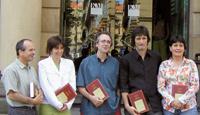Euclid. Elements in Basque
2005/09/01 Lopez Viña, Rakel - Marketin sailaElhuyar Fundazioa Iturria: Elhuyar aldizkaria
Mathematicians Euklides writes about the year 300 Elements. This classic author also left us other works such as Data, Phenomena, Division of Images and Optics, but undoubtedly his most important work was Elements.

The work is divided into thirteen books in which he explained the basic concepts of mathematics, properties, theorems that we have learned in school. From the definition of the point to the construction of regular polyhedra, he collected almost all the mathematics of the time. In the first four books and in the sixth he wrote on plane geometry; in the fifth book on magnitudes and proportion; in the seventh, eighth and ninth books he developed numerical theory; in the tenth book he made a classification of irrational numbers; and in the last three he worked on space geometry.
An example of the importance of this work is, on the one hand, the XIX. Until the end of the 20th century the book was used in schools to teach mathematics and, on the other hand, it is the most published and translated scientific book in most languages. But this book is also important: In Elements, Euclid materialized Aristotle's theory that all sciences must be built from their own elements, reasoning logically.
Conference on Euklides
The Department of Computer Science and Artificial Intelligence of the University of the Basque Country has organized a conference on Euklides on 5 October for
all interested in participating. This day will take place in the auditorium of the building I aki Barriola of the Campus of San Sebastian. The programme is available at www.zientzia.net.




